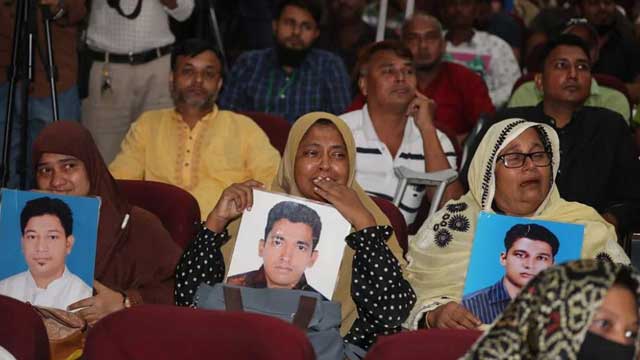Family members of enforced disappearance victims, human rights workers, politicians, academics, and lawyers on Wednesday called upon the government to bring the perpetrators involved in the crime to justice and put an end to such incidents.
Many of them pointed out that election years and opposition movements were the high times when such cases of disappearances had been mostly reported since the ruling Awami League came to power in 2009.
They also called upon the government to reveal the whereabouts of those who were still alive or locate the remains of those killed.
In Dhaka, Maayer Daak, a platform representing the families of the victims of enforced disappearances, hosted a programme while human rights defenders and the main opposition Bangladesh Nationalist Party formed human chains in different places to mark the International Day of the Victims of Enforced Disappearances.
The United Nations has been observing the day on August 30 every year since 2011 to express solidarity with the family members of the victims of enforced disappearance.
The Asian Human Rights Commission documented 623 cases of short- and long-term disappearances between January 2009 and June 2022 in Bangladesh.
Among the victims, a total of 153 individuals remain missing, 84 have been found dead, 383 have resurfaced, and no updates have been found about the three remaining cases.
It documented 36 more cases of disappearances—short-term and long-term—taking place between July 2022 and June 2023.
In the programme organised by Maayer Daak at the Institution of Diploma Engineers, Bangladesh auditorium, mothers, sisters, spouses, fathers, brothers, and children of victims of enforced disappearance, holding banners, placards, and portraits of the victims, narrated their agony and how their loved ones were picked up by members of the law enforcement agencies.
Children narrated how they spent their time without their fathers and how difficult it was for them to attend school or celebrate any festivals.
‘I have been waiting for seven years, and I want my father back,’ said Marium, one of the daughters of Mir Ahmad Bin Quasem, who was allegedly taken away by law enforcement agencies from their house in the capital’s Mirpur on August 9, 2016.
Abdul Baset Marzan, a senior assistant secretary of the Amar Bangladesh Party and former elected vice chairman of Mithapukur upazila council in Rangpur district, said that he was kept in secret detention for seven months after his abduction by a law enforcement agency from his friend’s house in the capital’s Mohammadpur on February 2, 2015.
He alleged he was kept handcuffed and blindfolded in a small, grave-like place and brutally tortured.
Dhaka University law teacher Asif Nazrul said that enforced disappearances took place to justify false elections, to rob banks, and to terrorise people.
He warned that since Bangladesh was a signatory to the Rome Statute on International Crimes, including genocide and crimes against humanity, perpetrators could be tried internationally if Bangladesh failed to hold their trial.
Children standing here today might see the trial in the future, he stated.
Social activist Farida Akhter said cases of disappearances were hampering the proper growth of children, and the United Nations Children’s Fund should put its focus on them.
BNP human rights secretary and Supreme Court lawyer Md Asaduzzaman promised that they would bring those perpetrators to justice through international and domestic legal instruments.
He said that all evidence to establish a crime against humanity was available when over 600 people were made victims of disappearances, mainly for political reasons.
Rights group Odhikar secretary ASM Nasir Uddin Elan said that, in their observation, the number of enforced disappearances increased before the national elections in the country.
He stated that the government started enforced disappearances after assuming power in 2009, and a large number of cases were reported during the 2014 election.
Enforced disappearances are again on the rise, though victims are being brought to court sometimes later, he said.
Maayer Daak coordinator Sanjida Islam Tulee read out a written statement at the programme.
‘Since 2009, reported cases of enforced disappearance in the country have commenced on a large scale. Numerous disappearances occurred prior to the controversial and fraudulent elections of 2014 and 2018, and subsequently,’ she said.
Mohammad Nur Khan, a human rights activist, said enforced disappearances increased during national elections when opposition parties mobilised.
He called on the government to identify the perpetrators involved in the disappearances. Otherwise, justice would be delivered regardless of how anyone shielded himself or herself, he said.
Saiful Huq, the general secretary of the Workers Party of Bangladesh, said enforced disappearances and the rule of law could not run in the same country, while Jatiya Samajtantrik Dal senior vice president Tania Rob said that victims of disappearances were connected with people.
Ganosamhati Andolan chief coordinator Zonayed Saki said enforced disappearances were being carried out to terrorise others.
Chairing the discussion, Maayer Daak coordinator Hazera Khatun said that she wanted to see her son Shajedul Islam Sumon return before her death.
Sumon was Dhaka city’s Ward 38 unit general secretary of the Bangladesh Nationalist Party. Along with seven others, he became a victim of disappearance in December 2013, just weeks before the January 5, 2014, national elections.
Maayer Daak placed a set of recommendations calling on the government to end enforced disappearances, ensure the immediate return of all disappeared persons to their families, refrain from harassing the families of the disappeared, and hold the perpetrators accountable.
Maayer Daak called on the authorities to conduct independent and impartial investigations into all allegations of disappearances in accordance with international law and to ensure justice for the victims.
Maayer Daak urges the government to allow the United Nations Working Group on Enforced Disappearances to visit Bangladesh.
‘Bangladesh must ratify the International Convention for the Protection of All Persons from Enforced Disappearance and adopt domestic legislation criminalising enforced disappearances.’
Maayer Daak also demanded that the UN Human Rights Council adopt a new mandate for Bangladesh to collect evidence of gross human rights violations.





